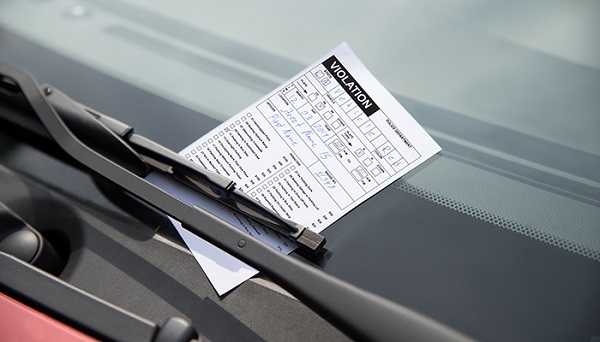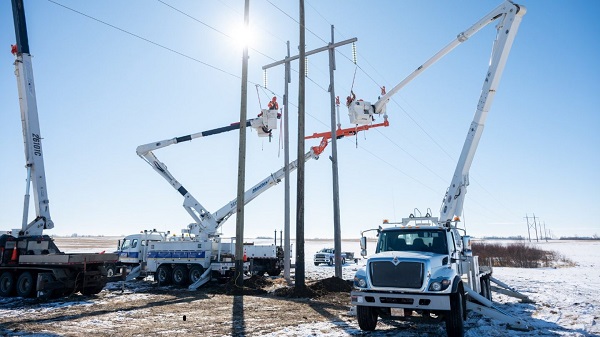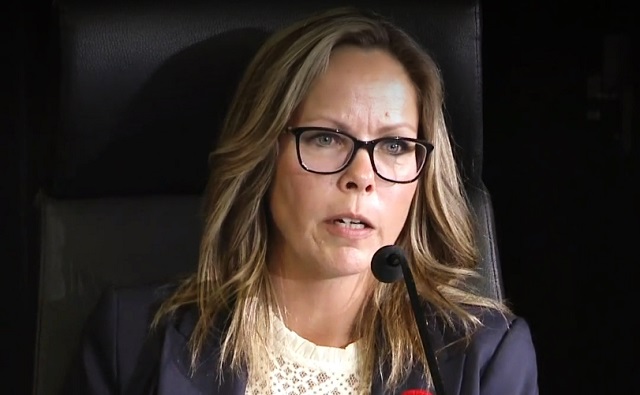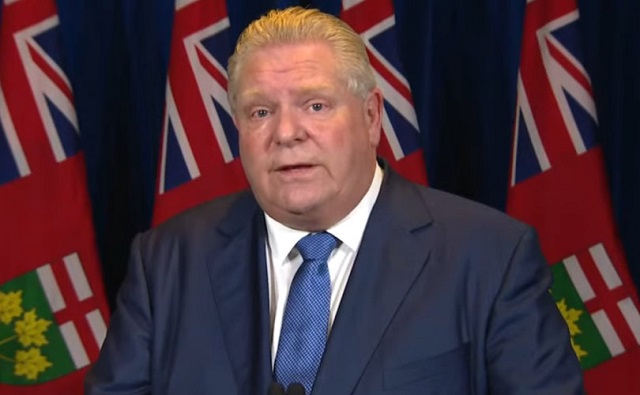City of Red Deer
City offering first come-first served plant and mulch rebate for local gardeners

From The City of Red Deer: Plant and Mulch Rebate Programs
Using native and drought-tolerant plants and permeable mulch in your home landscaping can save you time and money as your yard will require less watering and fertilizer.
New for 2019, The City of Red Deer is offering a Plant Rebate Program where residents who purchase plants that are native and/or drought-tolerant and plant them in their home landscaping can apply for a rebate of up to $50.

Application forms will be available:
- Online: Plant Rebate Form
- To print: Plant Rebate Application Form (pdf)
- To pick up from the first floor of City Hall (4914 – 48 Avenue) or from Environmental Services front desk at Civic Yards (7721 – 40 Avenue)
New for 2019, The City of Red Deer is offering a Mulch Rebate Program where residents who purchase and install permeable mulch in their home landscaping can apply for a rebate of up to $50.
- Online: Mulch Rebate Form
- To print: Mulch Rebate Application Form (pdf)
- To pick up from the first floor of City Hall (4914 – 48 Avenue) or from Environmental Services front desk at Civic Yards (7721 – 40 Avenue)

Who qualifies for a rebate?
You qualify if you:
- Are a city of Red Deer resident
- Have a City of Red Deer utility (water bill) account
- Purchase a plant from the 2019 Qualifying Plants List (pdf) in the 2019 calendar year
- Plant the approved plant on your own property located in the city of Red Deer
- Include an original or copy of the receipt of your plant purchase. The receipt must clearly indicate the name of the store, product name, price and date of purchase. Your name must be clearly written on the receipt.
- Include before and after photos of the landscaped area
- Include photos of the plant, ensuring the photo includes a plant identifier tag or label
The program will run from June 10 to October 25, 2019. A limited number of rebates are available on a first-come, first-served basis. A rebate of 50 per cent of the cost of approved plants, up to $50, is applied to your utility account. Please allow eight to twelve weeks for the credit to be applied to your account.
Maximum one plant rebate per utility account. Plants in pots or planters do not qualify.

How to select the right plants for my yard
- Rebates are only provided for the purchase of plants that are identified on the City of Red Deer qualifying plants list. This list includes plants that adapt well to Red Deer’s local conditions and that are low maintenance.
- When selecting plants and designing your yard consider the following:
- Location: does the location get full sun, partial shade, or lots of shade?
- Spacing: some plants grow high or spread out wide, plan the planting area for plant full maturity size.
- Soil texture: Red Deer’s soil can range from black loam to heavy clay. Consider adding mulch, compost, or conditioners (like manure, sand and perlite) to improve drainage and growing conditions.
- Soil pH and nutrient levels: some plants have specific pH and nutrient requirements. Select plants that can grow well in your soil’s current conditions. You may also work to adjust the pH and nutrient levels by using amendments like lime, compost, and slow-release organic fertilizers.
- Climate: how hot and dry does your yard get during the growing season?
How to care for my plants
- Applying mulch around your plants has multiple benefits, including conserving water, preventing weed growth, preventing soil erosion, and improving soil quality. Apply a layer of 2 to 4 inches of mulch, approximately 3 inches from the base of the plant. Apply for a mulch rebate today (see below).
- Native and drought-tolerant plants require more water during their first year, to ensure that the root system is strongly established. Water 1-2 times per week spring and fall months, and 2-3 times per week during the summer months of July and August. Use rainwater to water your plants. Apply for a rain barrel rebate today.

Frequently Asked Questions:
Why do before and after photos have to be taken?
Mulch that qualifies for a rebate must be used for the purpose of:
- Conserving water in a landscaped area
- Reducing erosion and stormwater pollution
Before and after photos demonstrate that the mulch was applied as landscaping or groundcover, rather than for cosmetic purposes.
Native/drought-tolerant plants that qualify for rebates must be used for the purpose of conserving water in a landscaped area. Before and after photos demonstrate that the plants were planted directly in the yard, rather than in pots or planters.
Why is there a qualifying plants list?
The qualifying plants list was developed to ensure that only non-invasive plants are purchased and planted. The list includes native and drought-tolerant plants that The City has determined grow well under local conditions and support the water conservation and water quality protection goals of the program.
Why can’t I receive a rebate for mulch or plants that were purchased prior to 2019?
There is a limited annual budget. Each year has its own budget and we want to ensure that as many residents have the opportunity to participate as possible.
How many rebates can I get?
Maximum one (1) Plant Rebate and one (1) Mulch Rebate per utility account is permitted.
How many rebates are available?
Funding is available for approximately 100 rebates in 2019. Rebates are issued on a first-come, first-served basis.
How long will it take for my rebate to be processed?
A credit will be applied to your utility account within 8-12 weeks.
For more information, please contact [email protected] or call 403-342-8750.
City of Red Deer
Red Deer will choose a new Mayor as Ken Johnston decides to step away

It’s a telling detail about the person who leads Red Deer City Council. Always putting the city’s needs ahead of his own, Mayor Ken Johnston has announced his intentions within days of the opening of Nominations for October’s municipal elections,
After 12 years on council, Mayor Ken Johnston has decided against running for a second term as Mayor this fall. Johnson shared his decision in front of colleagues and supporters in a touching announcement on Wednesday.
At 71 years old, Johnston remains vibrant, passionate and healthy. He says that’s exactly why he and his wife Carolyn have decided now is the right time to start their next stage of life together.
Mayor Johnston listed a number of highlights and achievements he can look back on, including his help advocating for the redevelopment of Red Deer Regional Hospital, the growth of Red Deer Polytechnic, and positive moves in Economic Development.
All these lead of a feeling of ease about the decision to step away, though affordable housing and a permanent shelter for the homeless remain pressing concerns.
With about 8 months remaining in his term, Mayor Johnston is planning to push hard to move the needle on these housing issues.
“We’re looking forward to some more work and we’ll be going to the community shortly about it. So I still have optimism that maybe before the term is out we can have an announcement.”
This is the second major political announcement in Central Alberta in the last number of days. Earlier this week Red Deer Mountain View MP Earl Dreeshen announced he won’t be running in the next federal election.
City of Red Deer
Council ends reduced fine option for early ticket payment, school and playground zones start at 7 AM

City Council approves first reading of updated Traffic Bylaw and General Penalty Bylaw
Red Deer City Council completed first reading of updated Traffic Bylaw (3707/2025) and General Penalties Bylaw (3036/A-2025) that will provide clarity and consistency in application of the bylaws as well as eliminate challenges in enforcement.
Key updates to the bylaws include:
- Ticket Pre-Payment:
- Removing the option to pay a parking ticket early to receive a reduced fee from the General Penalty Bylaw and adding it to the Traffic Bylaw.
- School and Playground Zone Start Times:
- Through investigating requests from schools to have school and playground zones start at 7 a.m., rather than 8 a.m., Administration determined that almost all school and playground zones in the city have students on the street prior to 7:30 a.m. To be consistent across the city, the start time is being moved to 7 a.m. providing an added measure of safety for all students.
- Salt on Sidewalks:
- Removing the provision prohibiting the use of salt on sidewalks as this provision was rarely reported and it is difficult and costly to enforce.
- Permits:
- More structure was added to the bylaw to clearly articulate conditions and requirements of Use of Streets Permits, as well as Excavation Permits and Alignment Permits.
- Lastly, fees for closures impacting on-street and off-street stalls have been adjusted to reflect the actual revenue in each parking zone rather than the flat fee.
- Penalties:
- Penalties have been reviewed and updated.
- During the last bylaw adoption, the penalty associated with vehicles being towed due to snow or street sweeping operations was inadvertently missed. This penalty has been added back in at a slightly higher amount due to an increase in the cost to tow a vehicle through The City’s contractor. This prevents the costs associated with towing vehicles during these operations from being subsidized by the tax base.
“These updates streamline the bylaws to create clarity for residents and administration,” said Erin Stuart, Inspections and Licensing Manager with The City. “They also help to eliminate regulations that are challenging to enforce and bring penalties in line with other City Bylaws.”
Second reading of both bylaws is anticipated for January 27, 2025.
-

 Business2 days ago
Business2 days agoBrookfield’s Deep Ties to Chinese Land, Loans, and Green Deals—And a Real Estate Tycoon With CCP Links—Raise Questions as Carney Takes Over from Trudeau
-

 Alberta2 days ago
Alberta2 days agoAlberta power outages and higher costs on the way with new federal electricity regulations, AESO says
-

 Alberta2 days ago
Alberta2 days agoHighway twinning from Sylvan Lake to Rocky Mountain House among dozens of infrastructure projects beginning in Alberta
-

 Alberta2 days ago
Alberta2 days agoPremier Danielle Smith calls for federal election
-

 Censorship Industrial Complex1 day ago
Censorship Industrial Complex1 day agoThey knew it was a lab leak all along
-

 Canadian Energy Centre2 days ago
Canadian Energy Centre2 days agoExperts urge caution with Canadian energy in response to Trump tariffs
-

 Energy1 day ago
Energy1 day agoTrump asserts energy dominance, set to meet oil titans amid trade war
-

 National2 days ago
National2 days agoConservative leader Pierre Poilievre reacts to new PM and Federal Cabinet





